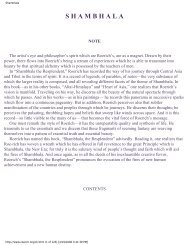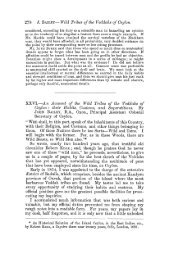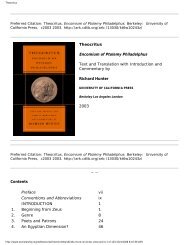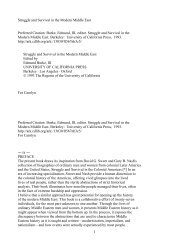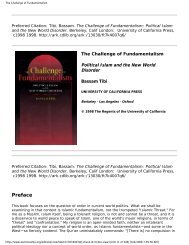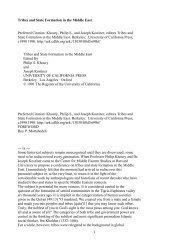Between Two Worlds Kafadar.pdf
Between Two Worlds Kafadar.pdf
Between Two Worlds Kafadar.pdf
You also want an ePaper? Increase the reach of your titles
YUMPU automatically turns print PDFs into web optimized ePapers that Google loves.
are meaningful, should not be formulated along the lines of a Sunni/Shi'i<br />
sectarianism. On the other hand, it seems equally misleading to see "heterodoxy"<br />
in any act or sign of belief which runs counter to the established norms of a<br />
learned orthodoxy. No such orthodoxy was yet established from the point of view<br />
of our protagonists, at least not with any dear-cut boundaries for them to stay<br />
within or to step outside. Maybe the religious history of Anatolian and Balkan<br />
Muslims living in the frontier areas of the period from the eleventh to the<br />
fifteenth centuries should be conceptualized in part in terms of a "metadoxy," a<br />
state of being beyond doxies, a combination of being doxy-naive and not being<br />
doxy-minded, as well as the absence of a state that was interested in rigorously<br />
defining and strictly enforcing an orthodoxy. None of the frontier powers seem<br />
to have had that kind of an interest. It was much later that a debate emerged<br />
among Ottoman scholars and statesmen with respect to the correctness of some of<br />
the practices of their ancestors.<br />
Wherever they stood with respect to the "right" kind of religiosity, warrior<br />
chieftains of the principalities neighboring Bithynia were not ridden with<br />
self-doubt as to what they stood for. A cursory glance at the epigraphic and<br />
titulary evidence left from these emirates reveals that they had heartily<br />
adopted the championship of the faith and related principles like gaza. Already<br />
settled in western Anatolia in the 1270s, a beg of the Germiyan family was<br />
called Husameddin , or "Sword of the Faith." Another member of the same family<br />
fell captive to the Mamluks in the Battle of Elbistan (eastern Anatolia) in<br />
1277; he was called Sihabeddin (Flame of the Faith) Gazi.[46] Muzaffereddin<br />
Yavlak Arslan (Victor-of-the-Faith Fearsome Lion, d. 1291 ) of the Cobanoglu<br />
family in Kasta-<br />
― 77 ―<br />
monu is addressed as nasirii'l-guzat (helper of the gazis) in a book completed<br />
in 1285-86 and dedicated to him.[47] One of the gazis he "helped" as the beg of<br />
the begs of the uc may well have been Osman Beg, who was based in the vicinity;<br />
in any case, a fellow warrior of Osman's in his first recorded battle was one of<br />
Yavlak Arslan's sons.[48] In Kütahya, the House of Germiyan's eventual seat of<br />
power where they played the role of suzerain over the other principalities for a<br />
while, an inscription from 1314 informs us that a medrese was built by an Umur<br />
Beg who bore the epithet Mubarizeddin , the "Combatant of the Faith."[49] The<br />
same epithet was donned by Aydinoglu Mehmed Beg, who had been sent to the Aegean<br />
region as a commander in the Germiyan forces. After falling out with Sasa Beg, a<br />
fellow warrior who was the actual conqueror of Birgi, Mehmed Beg took over that<br />
town, where he established his own dominion and built a mosque in 1312. The<br />
inscription of that mosque identifies him as a gazi in the path of God ( el-gazi<br />
fi sebilillah ).[50] When Mevlana Ce1aleddin Rumi's grandson, `Arif Çelebi,<br />
traveled from Konya to the frontier regions to establish his spiritual authority<br />
between 1312 and 1319, he referred to the same beg as the lord of the gazis. To<br />
the north of Bithynia, a certain Gazi Çelebi ruled Sinop until his death in<br />
1322, when his daughter replaced him.[51]<br />
These self-styled champions of the faith may have left a good deal to be desired<br />
in terms of conforming to the standards of some of the faithful: an enraged<br />
70




